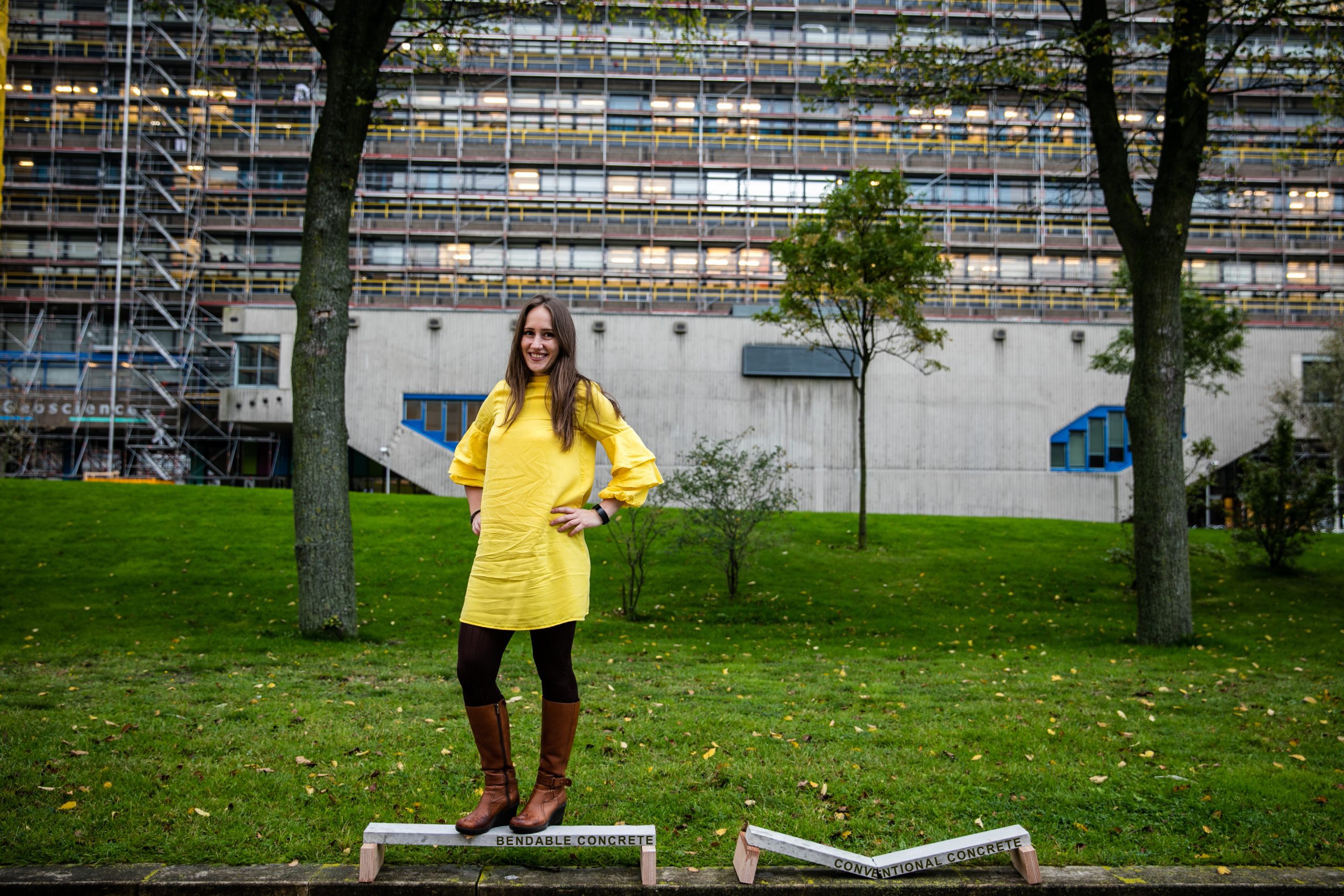Mladena Luković is this year’s best female Delft University of Technology PhD candidate. She received the Dewis Award for her research into Strain Hardening Cementitious Composite (SHCC), which she was awarded Cum Laude. How does she feel about winning this prize?
Mladena Luković: “I think that in general in Serbia, there are more women in academia than here.” (Photo: TU Delft/Frank Auperlé)
What does winning the Dewis Award (Dewis is the women’s network of TU Delft) mean to you?
“To be honest, my first reaction to the nomination was a bit like: ‘Nice, but why should there be a special prize for FEMALE PhDs? Why not for ALL PhDs?!’ It is not like some sport disciplines where men can perform better than women, and where organising separate competitions for women makes much more sense than organising a special prize for the best female PhD.
However, when at the Dewis symposium, just before the prize award ceremony, I saw the statistics showing the very low percentage of girls at the technical universities and among professors, I realised that it makes perfect sense. So from an initial feeling of doubt it became an honour. Already the fact that I was nominated and stood there in the spotlight with girls such as Daša and Anahita was a great pleasure and experience for me. However, the nicest thing during the symposium was the fact that a few girls approached me saying that I was their role model. There is no higher appreciation and reward for one’s work than this.”
Has your gender ever played a role in your career?
“In my career so far, I never felt nor experienced any gender related issues. Generally, civil engineering is not considered an option for girls. However, this proved to be false as soon as I enrolled in the Faculty of Civil Engineering in Belgrade: 40 percent of the students were girls. Therefore, no gender issues there.
When I came to the Netherlands, in the Microlab where I did my PhD, the percentage of girls was as high or even higher. But now in my functions in the Concrete Structures Group of the Stevin Laboratory and as the advisor to the Rotterdam Municipality in the Maastunnel project, and looking at the numbers presented at the Dewis symposium, I realise that the percentage of girls at TU Delft and in engineering in general is significantly lower.”
You are originally from Serbia. What is the position of women in academia like there and what might we learn from that in Delft?
“I think that in general in Serbia, there are more women in academia than here. During my BSc and MSc, I had so many female professors that I never noticed any gender related issues.”
Why do you think that is?
“I don’t know for sure. My first guess would be the historical heritage of the country. Serbia was a socialist, or ‘workers’ state, where men and women had to work equally. My mother had the same chances to develop her career as my father and they both worked five days a week while my brother and I went to kindergarten and later to school. And all my classmates were in the same situation.
On the other hand, the Netherlands and other developed countries like some Scandinavian countries, offer much better conditions for mothers, for example working part time. However, while having many benefits there are also consequences. In my opinion, it is difficult to imagine that women who work part-time or take a break for a period of years, can compete for the highest positions with men who work full-time and who do not take a break. Not to mention that the age group 25-40 years is mostly the period when people are most eager to work.
‘The harder the battle, the sweeter the victory.’
Let me be clear, I don’t mean to say that having the opportunity to work part-time is bad. On the contrary, I might be the first one to go for this option. It is just that I believe that the chances of women ‘winning the highest functions’, no matter how good their starting position was, might simply be lower.
Both men and women should be aware of this and should try to encourage each other more. Because one thing is clear: both men and women prefer working in mixed groups rather than having only men or women around them. The reason why I mentioned Scandinavia is that at the Dewis symposium, I learned that, contrary to what one might think, less than five percent of professors in some Scandinavian countries are women.”
You received your PhD with cum laude honours. What was your main topic and what did you find?
“I was doing my PhD on concrete repair. As you know, most of the structures around us are made of concrete. Beside water, humans consume no other material in such quantities. However, our concrete infrastructure is ageing and we are facing serious challenges on how to deal with it.
One possible solution is to repair it, but the life of current repairs is too short, around ten years. So we absolutely need improvements. A material that might offer a solution is so-called bendable concrete, scientifically known as Strain Hardening Cementitious Composite (SHCC). The main benefit of this material is that it is ductile and has damage resistant behaviour. For example, instead of getting one large crack as we would get with conventional concrete, we would get many tiny cracks which are better for the durability of repairs and can significantly extend the life of the concrete structure.
And then, in terms of repair, simply making perfect repair material is not enough. There is always the interaction of the material with the old concrete which is crucial for good performance. So I researched the influence of many parameters – such as moisture exchange between the old and new material, bond strength, how to prepare the old concrete etc. – on the performance of repair. In the end, I was happy that Rotterdam Municipality gave me the opportunity to use my knowledge and apply bendable concrete in the trial repair in the Maastunnel, one of Rotterdam’s most important connections and a structure of the highest historical value.”
You still work at TU Delft as a post-doc. How do you see your future after that?
“I will soon finish my post-doc contract and start a tenure track assistant professor position in the same group, Group of Concrete Structures. I will continue my current work – upscaling and bringing new innovative concrete types to structural applications. My background is a good match for this: MSc education in structural engineering, PhD in the materials group – Microlab, and the post doc in the group of Concrete Structures. So I think that this combination of material and structural knowledge gives me a great opportunity to take a step forward and enable our society to benefit from all the new concrete types that were developed recently.”
Do you have tips for other young women in science?
“I do not have any special tips for other young women in science or engineering. Every girl should do it in her own way. I do not want to sound stereotypical but: ‘Girl, there is no occupation in which you cannot excel!’ Therefore, I would like to show the photo of my best friends from the Faculty of Civil Engineering in Belgrade. If these four girls made it, you can too! And if you do experience difficulties, irrespective of whether you are a girl or a boy, you should always persist and keep in mind that ‘the harder the battle, the sweeter the victory!’”
Want to know more about Dewis? Go to their website.
 From left to right: Mladena Luković, Jelena Gavrilović, Marija Lazović, Svetlana Grković
From left to right: Mladena Luković, Jelena Gavrilović, Marija Lazović, Svetlana GrkovićMladena Luković obtained her BSc and MSc degree at the Faculty of Civil Engineering in Belgrade, Serbia. The topic of her BSc thesis was the Structural design of a six storey reinforced concrete building and for her MSc thesis she dealt with Durability of reinforced concrete structures exposed to carbonation process. She graduated in August 2011. She became a PhD candidate in November 2011 studying concrete repair in the Microlab group at the Delft University of Technology. She defended her PhD thesis Influence of interface and strain hardening cementitious composite (SHCC) properties on the performance of concrete repairs in January 2016. Since 1 April 2016 she has worked in the Concrete Structures group at the Delft University of Technology. Her research topic is the application of innovative materials in new and existing structures.



Comments are closed.